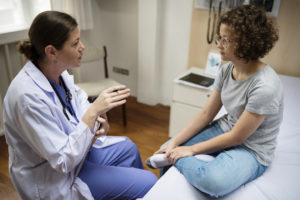
The IACC Working Group brings together many groups to focus on the health issues and outcomes among people with autism spectrum disorder (ASD).
The Office of Autism Research Coordination (OARC) at the National Institutes of Health (NIH) held a meeting of a working group within The Interagency Autism Coordinating Committee (IACC) at Neuroscience Center (NSC) at The National Institute for Mental Health (NIMH) on September 27, 2018. This workshop, “Improving Health Outcomes for Individuals on the Autism Spectrum,” focused on health epidemiology, patient-provider interactions, and co-occurring health conditions that affect people with Autism Spectrum Disorder (ASD.)
As a practitioner working with individuals who have medically complex autism, I felt compelled to attend this meeting addressing the co-occurring conditions of ASD, and to learn about the government’s plan to guide research and treatment as well as strategize on how to address the inadequate level of care provided by physicians who lack appropriate training on the complex medical needs of people living with ASD.
What is the IACC?
IACC is a Federal Advisory Committee comprised of a group of federal officials and non-federal public members which aims to provide advice to the Secretary of Health and Human Services on issues related to Autism Spectrum Disorder (ASD).
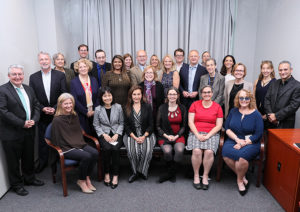
The IACC Working Group Speakers & Staff
Members of the committee represent federal agencies within the National Institutes of Health (NIH), including the National Institutes of Mental Health (NIMH), National Institutes of Environmental Health Sciences (NIEHS), National Institute of Child Health and Human Development (NICHD), National Institute of Deafness and Other Communication Disorders (NIDCD), Office of Children’s Health Protection (OCHP), National Institute of Neurological Disorders and Stroke (NINDS), and several others.
Other federal agencies represented include; US Food and Drug Association (FDA), the Environmental Protection Agency (EPA), US Department of Education (DOE), Department of Defense (DOD), Social Security Administration (SSA), Centers for Medicare and Medicaid Services (CMS), Centers for Disease Control (CDC), and more.
Public members of the IACC committee include; distinguished professors and researchers from leading Universities, and directors of ASD organizations and foundations.
In 2018, the IACC formed a working group to provide recommendations to the full IACC committee for strategic planning around health and wellness issues affecting those with ASD. This working group roster includes some current IACC members, federal agency officials and individuals invited to participate, including autistic adults, family members, advocates, researchers, providers, and community stakeholders.
That’s a lot of important people (and a lot of acronyms) coming together to exchange information between the various member agencies in a public forum to discuss ASD related research and services. IACC meetings include presentations and discussions around advances in science and autism policy issues. These meetings are open to the public.
In addition, for those unable to attend, the meeting is available through live webcast and conference call. The general public is invited to submit both written public comments and oral public comments to be read and discussed at the meetings. Of course, comments are subject to specific guidelines and only a selection of comments are presented.
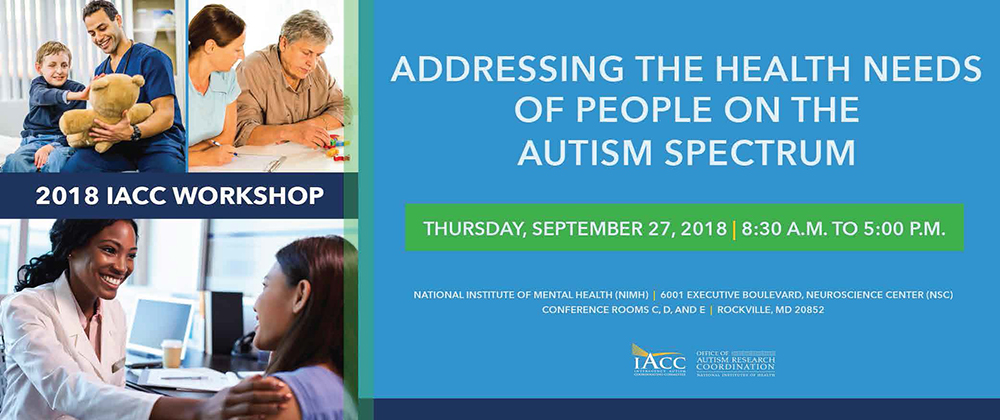 This working group, co-chaired by Dr. David Amaral of the UC Davis Mind Institute and Julie Lounds Taylor, PhD of the Vanderbilt Kennedy Center, invited a notable list of speakers to make presentations on the commonly occurring comorbid conditions of autism including gastrointestinal disorders, sleep disorders, and epilepsy, and concluded with a lecture on the healthcare experiences of children and adults with ASD.
This working group, co-chaired by Dr. David Amaral of the UC Davis Mind Institute and Julie Lounds Taylor, PhD of the Vanderbilt Kennedy Center, invited a notable list of speakers to make presentations on the commonly occurring comorbid conditions of autism including gastrointestinal disorders, sleep disorders, and epilepsy, and concluded with a lecture on the healthcare experiences of children and adults with ASD.
Quality of Life
Jeremy Parr, M.D. Professor of Pediatric Neurodisability, Newcastle University Institute of Neuroscience, United Kingdom, presented “Health and Healthcare for Adults on the Autism Spectrum: The Newcastle University Adulthood and Ageing Research Programme”
Dr. Parr’s lecture focused on quality of life issues for those children and adults living with ASD. He reviewed his published studies, one of which shows the prevalence of co-existing conditions, using data from 3900 families of children with ASD. The data revealed the following co-occurring conditions common in ASD:
- Sleep problems – 75%
- Hyperactivity – 82.9%
- Injury to self – 41.9%
- Anxiety, fears, or phobias – 80.9%
- Feeding problems – 79.6%
Dr. Parr discussed the need for an international collaborative effort to identify a core set of demographic, health behavior, and health outcome indicators specific to individuals with ASD, to design a personalized annual health check program for those with autism, and the need for integrated research approaches including longitudinal studies that address autism and ageing.
Co-Occurring Conditions
Lisa Croen, PhD., Senior Research Scientist, Division of Research, Kaiser Permanente Northern California, and Director, Kaiser Permanente Autism Research Program, presented “Physical and Mental Health in Autism – Epidemiology of Co-occurring Conditions”
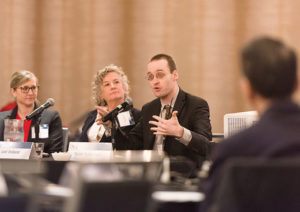
Dr. Scott Michael Robertson, an autistic adult and policy advisor at the U.S. Department of Labor’s Office of Disability Employment Policy, shares his unique perspective with the committee.
Dr. Croen discussed co-occurring conditions that cluster together in individuals with ASD including sleep, constipation, feeding, and speech disorders. She discussed the conditions that emerge across a lifespan of an individual with ASD. In early childhood, these conditions include GI, sleep, overweight, and immune issues. In adolescence they include obesity, depression, and anxiety. In adulthood, common comorbidities include diabetes, cardiovascular conditions, Parkinson’s, and dementia.
Dr. Croen also addressed the gaps that need to be dealt with in terms of biologic pathways and etiology of ASD. Most importantly, she asked whether early onset of co-occurring conditions should be early warning signs or red flags and possibly be used as a screening tool for ASD.
I was encouraged to hear Dr. Croen mention the possibility of early medical conditions as red flags for emergence of ASD. I feel strongly that symptoms which present within the first years of life, like GI issues including reflux/constipation/diarrhea, picky eating behaviors, regulation issues in infancy, especially inability to self soothe, and difficulty sleeping are only a few conditions that often emerge before the developmental and behavioral markers of ASD. At FFH, we address these early warning signs in our article “Recognizing the Red Flags of Autism and What to do Next.”
Epilepsy
Gregory Neal Barnes M.D. PhD., UL Autism Center & BioImaging Laboratory, Departments of Bioengineering and Neurology University of Louisville, offered a presentation on “Epilepsy in Autism Spectrum Disorders: Shared Mechanisms.”
In his lecture, he discussed the shared neurobiology of ASD and epilepsy and their possible mechanisms. Dr. Barnes explained that individuals with autism have a 3-fold greater chance of having epilepsy if they also have intellectual disability.
Sarah J Spence, M.D. PhD., Boston Children’s Autism Spectrum Center, prepared a report titled, “Epilepsy in Autism Spectrum Disorder: The Clinical Picture.”
In her report presented by Dr. Amaral, she states that up to 30% of ASD patients have epilepsy and that infantile spasms occur in 6% of people diagnosed with ASD. She reviewed other syndromes that are associated with ASD and epilepsy including Tuberous Sclerosis and Landau Kleffner Syndrome.
In her slides, she identified typical seizure behaviors and their similarities with typical ASD behavior making it difficult for expert epileptologists to tell the difference between seizures and behaviors. Unrecognized seizures can lead to behavioral intervention approaches and delay essential medical treatment. Dr. Spence cited studies showing 5-6x higher mortality in those with ASD plus epilepsy than ASD alone.
Pharmacological treatment for epilepsy was reviewed in her slides which also indicated that new cannabis data is sparking a lot of interest.
Gastrointestinal Disorders
Timothy Buie, M.D., Attending Physician, Division of Gastroenterology, Hepatology and Nutrition, Boston Children’s Hospital, and Assistant Professor of Pediatrics, Harvard Medical School, presented on “Autism and Gastrointestinal Disorders.”
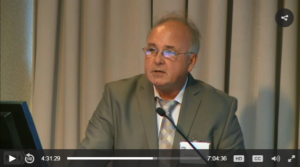
Dr. Timothy M. Buie presents his talk on Autism and Gastrointestinal Disorders, which very often occur together in autistic individuals.
Dr. Buie explained that research on common GI disorders had produced a wide range of prevalence data which resulted in a consensus meeting to review the research. The consensus report suggests evidenced based treatment is not yet available, however, individuals with ASDs deserve the same thoroughness and standard of care in the diagnostic workup and treatment of gastrointestinal concerns as patients without ASDs. He reported newer data supports a more consistent prevalence of 45- 70% of children with ASD suffer from GI issues, which commonly include diarrhea, constipation, abdominal pain, and acid reflux.
Dr. Buie discussed early theories of causation, one including Dr. Andrew Wakefield’s lancet study on Autistic Enterocolitis. Dr. Buie reported that after the Wakefield paper was published, parents flocked to GI doctors to get help for their children. While the possibility of autistic enterocolitis was the stimulus for the visit, he suggested that autistic enterocolitis was not a distinct entity, however, one possibility on a list of GI issues he was diagnosing.
He presented other theories on increased intestinal permeability (leaky gut), impaired digestion of carbohydrates, and disruption of typical microbiota, among others. He reported children with ASD commonly have food allergies, feeding disorders which include picky eating (now identified in the DSM V as Avoidant Restrictive Food Intake Disorder), and nutritional deficiencies. He discussed the gut/brain connection indicating that various disruptions in the microbiome may affect nervous system communication. He cited numerous studies that point to altered microbiome in populations of children with ASD.
Dr. Buie also reported on gut therapies, including fermented milk products with probiotics and microbiota transfer therapy, and emphasized that problem behaviors can be medically based and warrant proper medical evaluation.
For more information on GI disorders check out our article “Common GI Disorders in Autism.”
Sleep Disorders
Beth A. Malow, M.D., M.S., Burry Chair in Cognitive Childhood Development Professor of Neurology and Pediatrics Director, Sleep Disorders Division Vanderbilt University Medical Center, presented on “Autism Spectrum Disorder and Sleep—Identifying Challenges and Finding Solutions.”
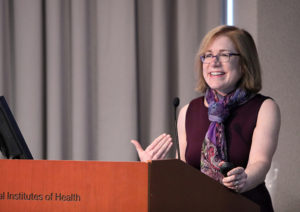
Dr. Beth Ann Malow speaks on the interrelationship of sleep and neurological disease.
Dr. Mallow explained that sleep disorders can have environmental/behavioral, biological and/or medical etiologies. She reported studies showing melatonin levels in ASD appear to be normal, even in those with sleep-onset insomnia. Dr. Mallow emphasized the importance of sleep and discussed how sleep deprivation affects emotional regulation, behavior, and core symptoms of ASD.
In terms of treatment, she recommended looking for medical co-occurring conditions that affect sleep, using appropriate behavioral approaches, and simultaneously considering medication for overwhelmed individuals and families. She indicated that future research should look for genetic or biomarker studies to guide treatment plans.
Provider Interactions & Challenges
Micah Mazurek, Ph.D., Associate Professor of Education, Curry School of Education, University of Virginia, presented on “Patient – Provider Interactions-Healthcare Experiences of Children with Autism: Opportunities for Improvement.”
In this presentation, Dr. Mazurek discussed the effect of co-occurring conditions and their impact on families. She reported that children with ASD have greater unmet healthcare needs, worse access to a medical home, and less coordinated family-centered care. She emphasized that children with ASD and comorbid conditions have even worse health care experiences and greater financial strain.
Dr. Mazurek reviewed barriers to care, pointing to challenges to accurate assessment of co-occurring symptoms, as well as providers’ lack of knowledge and confidence in identifying and treating comorbid conditions.
Christina Nicolaidis, MD, MPH, Professor, Portland State University Co-Director, Academic Autism Spectrum Partnership in Research and Education, and Dora Raymaker, PhD, Research Assistant Professor, Portland State University Co-Director, Academic Autism Spectrum Partnership in Research and Education, presented on “Healthcare for Autistic Adults; Challenges and Solutions.”
The speakers discussed healthcare disparities in autistic adults, including greater emergency room visits, greater prescription medication needs, and decreased gynecological visits and cervical cancer screenings when compared with the general population. They also discussed barriers to care, including fear and anxiety, communications deficits, and concerns for cost, among others.
Sensory sensitivities in healthcare settings were a significant issue in a study, as was the ability to isolate sources of pain. Lastly, they provide a resource Healthcare Toolkit for patients with ASD and their supporters to help providers to better understand their needs.
Learn More
To help you learn more about any of these speakers topics, the IACC has all of the presentation slides for the entire working group meeting available to the general public. In addition, the IACC is required to develop an annual strategic plan for ASD research and to publish an update of the summary of advances in ASD research. The IACC 2017 Strategic Plan for Autism Spectrum Disorders and the 2017 Summary of Advances in Autism Spectrum Disorder Research are both available to the public.
How can you get involved?
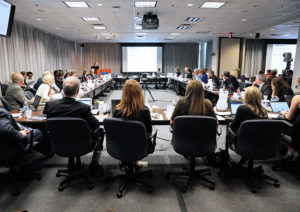
Many different government agencies and medical specialties came together around the table to help the Autism community.
Under the Combatting Autism Act (CAA) of 2006 and renewed under the Autism Collaboration, Accountability, Research, Education, and Support (CARES) act of 2014, the IACC is responsible for providing guidance to HHS through its partnerships with Federal agencies, research and advocacy organizations, and the autism community, to guide research and treatment services with the goal of improving the lives of people with ASD and their families.
The IACC has provided a platform for the public to get involved, yet the meeting of the IACC working group to address the healthcare needs of individuals on the autism spectrum held on Sept 27, 2018 had a very low attendance. While this meeting is open to the general public, there were roughly 20 people in attendance outside of the committee.
The autism community needs to use its voice more loudly and clearly when the opportunity is there. It is imperative that HHS hears stories from families struggling to have their children’s health care needs met by physicians who understand the difficult to diagnose medical disorders seen in ASD, yet are commonly unrecognized and therefore left untreated.
These complex medical issues often lead to aggressive and self-injurious behaviors which become unmanageable to families and result in unnecessary hospitalizations and placements in psychiatric institutions.
As a community, we need to mobilize and show up at these IACC meetings in force. We need to submit public comments, both oral and written, to show the committee that we are paying attention, and that we expect the voices of those who live with the challenges of ASD every day to be heard.
With autism on track to cost our nation $500 million, potentially $1 trillion by 2025; with families struggling with unresolved medical issues and less than appropriate medical care; severe behavioral disorders destroying family units; overwhelmed teachers and schools unable to provide appropriate education; insurance refusing to cover medical and therapeutic services; the time is now to make your voices heard.
The platform is there. We need to use it, like never before.




There is a very good summation of the biochemistry of autism at the site http://wipeoutautism.org/
The data presented on the site is very, very typical of kids with ASD. I have over 200 kids now on record and they are all pretty much exactly the same. Despite what people might think it is a very, very simple condition and could easily be avoided
These meetings are not publicised or announced to those that need to know about them…sadly we only find out about them afterwards with reports …also many parents have no one to watch their Autistic child to attend such meetings.Can virtual meetings be done in the future like video conferences or job trainings are now done to spare travel expenses for parents and caregivers of autistic persons ? That would be helpful. and send out messages to every parent of an Autistic child so they have the opportunity to know about them.If you have or ever have received therapy for your child you should be notified by text or snail mail or email! It is sad that no one finds out about these meetings…we do care…we are just overwhelmed and if it is not put right in front of us boldly…we are too busy and preoccupied with chasing… feeding…changing large diapers…and caring for our Autistic children to seek out. Information needs to reach us rather than us searching for it…create a registry thru the pediatrician’s and services…